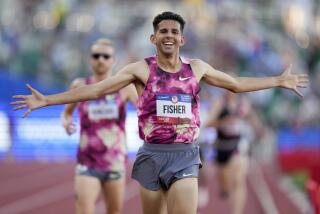Kastor gives U.S. hope in marathon
- Share via
After measuring her life in hours and miles, after building up endurance for an event that can be won in a sprint to the finish, Deena Kastor has discovered it’s timing, not time, that really matters.
And her timing is superb, positioning her today to become the first American woman to win the New York City Marathon since Miki Gorman triumphed in 1977.
Kastor, who grew up in Agoura Hills and lives in Mammoth Lakes, didn’t run her first marathon until 2001, when she was 28. That was at New York, where she finished seventh in an American debut-record time of 2 hours 26 minutes 58 seconds.
Three years later, she won a bronze medal at the Athens Olympics, persevering through blistering heat to her joyous finish at Panathinaiko Stadium. Little more than six months ago, she broke her own American record by winning the London Marathon in 2:19:36.
If she had switched to the marathon sooner and abandoned the 10,000, at which she won four national titles, or stopped running cross-country, in which she twice won silver medals at the world championships, her marathon resume might be even more impressive. But Kastor, who was Deena Drossin until she married physical therapist Andrew Kastor in 2003, has no regrets.
“It used to be that distance runners would turn to marathons as their careers wound down,” she said. “That’s not the case anymore. Your body needs to be mature enough to handle the distances, and it shouldn’t be at the end of your career, when you’re losing interest.”
Racing consumes her. A month before the New York Marathon, she was running 130 to 140 miles every week at an altitude of about 8,000 feet, sometimes in the snow. She sleeps 10 hours a night and naps an hour or two a day.
“And there’s a lot of eating,” she said, laughing, referring to the frequent meals that fuel her workouts over those hilly and often chilly miles. To others, her schedule might seem constricting. She believes it opens a world of opportunities.
“It’s a choice, to get the perfect race out of myself,” she said. “There hasn’t been a single performance in my career that I felt like it was career-capping. I continue to reinvest my energy and create goals for myself. I always feel there’s more I can get done.”
Kastor and Meb Keflezighi, a UCLA alumnus who won the silver medal in the men’s Athens Olympic marathon, are at the forefront of a mini-renaissance in American distance running.
No American man has won at New York since Alberto Salazar in 1982, but Keflezighi has finished in the top three in each of his last five marathons. Keflezighi, who was born in Eritrea but emigrated to San Diego in 1987 and is a U.S. citizen, was second at New York two years ago, 70 days after his Athens runner-up finish. He also finished third at New York in 2005.
Paula Radcliffe of Britain, who has four of the top five women’s marathon times, is pregnant and won’t run today. But the field remains deep, with defending champion Jelena Prokopcuka of Latvia, Boston marathon champion Rita Jeptoo of Kenya, three-time New York runner-up Susan Chepkemei of Kenya, and Athens silver medalist Catherine Ndereba of Kenya, who has finished second twice at New York, won four times in Boston and won twice at Chicago.
Mary Wittenberg, race director of the New York Marathon, called Kastor “our star” and said she can win, though it might take “the best day of her life.”
A triumph for Kastor would surely resonate beyond the 26-mile 385-yard course that starts in Staten Island, at the Verrazano Narrows Bridge, and winds through every borough before it ends in Manhattan’s Central Park.
“Winning in New York could not only elevate Deena but will continue to elevate American distance running,” Wittenberg said. “We hit the bottom of the barrel six years ago, when we hung our heads in desperation that we couldn’t field full teams in the Sydney marathon. Four years later, Deena and Meb won medals and we were the only country to win two medals in the marathon.
“Meb has gone on to win a medal in New York and Deena won at Chicago [in 2005] and London. We have high-performance running camps
Kastor remembers hearing American distance runners denigrated a decade ago.
“It was, ‘U.S. runners can’t compete with Africans,’ ” she said. “They were so far ahead of where we were. Now, every year, we continue to see American records broken. We are competitive on the world stage.”
No one is more competitive than Kastor, who said New York would be her last “selfish” race before she begins planning for the 2008 Beijing Olympics. She anticipated a tactical race for the first half and breakaway attempts in the second half, and she has visualized coming into Central Park “three girls together, four girls, all of us fighting” to prepare herself for jostling and stray elbows.
“It’s going to be a fight,” she said. “It’s going to be about rallying and re-rallying and re-rallying.
“It’s been burning in me for five years. To have that finish line tape breaking across my chest is something I’ve seen in my dreams and visualized in my training.”
The timing may be right for her dreams to become reality.
More to Read
Go beyond the scoreboard
Get the latest on L.A.'s teams in the daily Sports Report newsletter.
You may occasionally receive promotional content from the Los Angeles Times.











